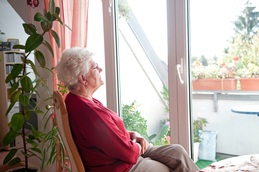Despite the pressing issue of flood peril, Brits fear losing their independence just as much

Becoming reliant on care workers is not always a scenario members of the public are prepared for, but we are not as ignorant of the likelihood as studies often suggest, according to the findings of a British Red Cross survey.
Often judged to be in the dark on pressing care sector issues – such as an ageing population and rising numbers of people diagnosed with dementia – the obliviousness of the general public was one of the key observations of the 2010 Dilnot Commission that informed the Government’s Care Bill. However, an online survey of 2,000 people by humanitarian charity the British Red Cross has found loss of independence to be the ‘most feared personal crises’ among members of the public, alongside flooding.
Whether due to old age or becoming dependent for other reasons, the survey recorded the same results among younger contributors as it did among those approaching retirement.
The charity was inspired to conduct the survey after a Christmas period that saw a rising number of people seeking out their volunteer services, due to floods and power cuts, and yet losing one’s independence emerged as of equal concern.
British Red Cross chief executive Sir Nick Young sees a crucial few years ahead for humanitarian aid in the UK, with three quarters of individuals claiming to have experienced a period of crisis in their lives and 37 per cent fearing another within the next five years.
He comments: “There is a growing number of people facing crisis in this country and our research shows over 30 per cent of people would be reluctant to turn to a voluntary organisation either because they are embarrassed to ask for help, or fear diverting resources.
“We understand that every crisis is personal, and valid, and the Red Cross has local services across the UK that can help to ease the burden. We are asking the public to support us in supporting those in need.”
Latest News
 29-Jul-24
Dementia Bus gives carehome.co.uk staff insight into life with dementia
29-Jul-24
Dementia Bus gives carehome.co.uk staff insight into life with dementia
 27-Jul-23
UK's top home care agencies in 2023 revealed
27-Jul-23
UK's top home care agencies in 2023 revealed
 30-Nov-22
A quarter of older people keep their falls secret from family
30-Nov-22
A quarter of older people keep their falls secret from family
 29-Nov-22
'Covid-19 has not gone away' say terminally ill
29-Nov-22
'Covid-19 has not gone away' say terminally ill
 28-Nov-22
IT consultant who received poor care opens 'compassionate' home care business
28-Nov-22
IT consultant who received poor care opens 'compassionate' home care business